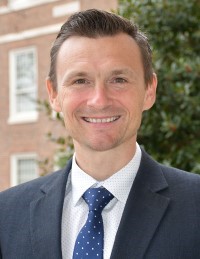Developing Innovative Simulation-Based Training to Improve Patient Safety in Radiation Oncology
Lukasz Mazur, Ph.D.
Associate Professor of Radiation Oncology
UNC School of Medicine

“AHRQ funding enabled me and my team to develop innovative simulation-based training strategies and measure their impact.”
Radiation therapists are the last line of defense to catch any errors during the treatment planning stage, before treatment begins, according to Lukasz Mazur, Ph.D., associate professor of radiation oncology and director of the Healthcare Engineering Department at the University of North Carolina (UNC) School of Medicine. Dr. Mazur’s research goal is to ensure the safe delivery of radiation therapy.
Radiation therapy is a cancer treatment that uses high doses of radiation to kill cancer cells and shrink tumors. Approximately 18,000 (3%) of the 600,000 patients who receive radiation therapy annually might be adversely impacted by operational errors, with some resulting in either healthy tissue being exposed to unnecessary levels of radiation or the tumor site not receiving the full effect of radiation. While radiation therapy has relatively low error and injury rates, studies show that most errors occurring during radiation cancer treatment originate in the planning stage.
In 2014, AHRQ awarded Dr. Mazur a grant to develop and assess the impact of simulation-based training on radiation oncology providers' workload and performance during treatment planning and quality assurance. Simulation is a technique that mimics real-world clinical events in a training environment so clinicians can practice and improve their responses to urgent situations without the risk of harming patients.
Dr. Mazur found that the radiation therapists who participated in his simulation-based training study demonstrated significant improvement in procedural compliance with quality assurance tasks compared with the control group, which did not undergo simulation training. Although there was no significant difference in clinical performance, Dr. Mazur and his team concluded that simulation training can help radiation therapists acquire new skills and knowledge and improve procedural compliance.
With a continued focus on patient safety, Dr. Mazur received another AHRQ grant in 2015 to assess the usability of an electronic health record (EHR) system for the management of abnormal test results with physicians’ mental (cognitive) workload and performance levels. According to Dr. Mazur, his project was motivated by existing research that had found that providers still were challenged to follow-up quickly with abnormal diagnostic test results. He said, “My goal was to make usability improvements within the EHR that could enhance providers’ ability to acknowledge and follow up on critically abnormal test result alerts.”
His study found that EHR enhancements—such as displaying clear patient status information, automatically sorting critical test results into a dedicated folder for patients who failed to show up for a follow-up visit, and providing decision support instructions for next steps—were linked to better physician workload and performance.
In 2018, Dr. Mazur received another AHRQ grant to expand upon his initial 2014 simulation-based training project. He developed and assessed the effect of adding neurofeedback to simulation-based training on radiation therapists’ mental workload, situation awareness, and performance. Neurofeedback is a treatment that provides real-time feedback of individuals’ brainwave patterns to help gradually train the brain to produce healthier patterns of activity, which can help improve mental clarity, concentration, and reduce stress. His project, which ended in 2022, concluded that neurofeedback is a promising tool to sustain performance improvements gained during simulation-based training.
According to Dr. Mazur, “Approximately 40 percent of the errors reported to a national event registry were discovered by radiation therapists. Because of the key role radiation therapists play in the detection of errors and in the delivery of the treatment, there is a critical need to continue developing and assessing the impact of simulation-based training and neurofeedback interventions on radiation therapists’ performance.”
In addition to his other roles, Dr. Mazur is an adjunct assistant professor in the Carolina Health Informatics Program at UNC. He also is an adjunct assistant professor in the Department of Biomedical Engineering at UNC and North Carolina State University.
Principal Investigator: Lukasz Mazur, Ph.D., Associate Professor of Radiation Oncology
Institution: UNC School of Medicine
Grantee Since: 2014
Type of Grant: Various
Consistent with its mission, AHRQ provides a broad range of extramural research grants and contracts, research training, conference grants, and intramural research activities. AHRQ is committed to fostering the next generation of health services researchers who can focus on some of the most important challenges facing our Nation's health care system.
To learn more about AHRQ's Research Education and Training Programs, please visit https://www.ahrq.gov/training.



